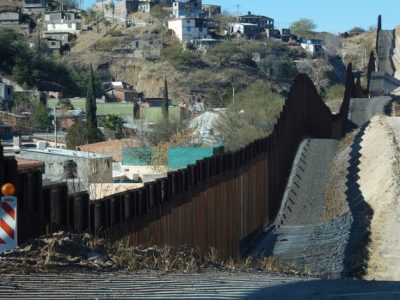Immigration at the Border

What Arizona v. United States May Mean for States with Similar Immigration Laws
In April, the U.S. Supreme Court will hear arguments in Arizona v. United States, a case addressing the legality of the Arizona immigration law known as SB 1070. According to the statement of legislative intent, the law was designed to make “attrition through enforcement” the official policy of all state and local agencies in Arizona. Following the passage of SB 1070, numerous other states—including Alabama, Georgia, Indiana, South Carolina, and Utah—passed legislation with similar provisions, which have also been challenged in court. Read More

Q&A on Office of Inspector General Reports on Secure Communities Program
In April 2012, the Department of Homeland Security (DHS) Office of Inspector General (OIG) released two long-awaited reports on the Secure Communities Program: Operations of United States Immigration and Customs Enforcement’s Secure Communities and Communication Regarding Participation in Secure Communities. Why did the DHS OIG issue these reports?The reports were issued at the request of Congresswoman Zoe Lofgren (D-CA) in April 2011 due to concerns about the implementation of Secure Communities, as well as concerns that DHS misled the public and local officials regarding whether the program was mandatory or voluntary. Read More

Colorado, Hawaii and Delaware Progress on Tuition Equity for Undocumented Students
Legislation intended to make college education more affordable for undocumented students continues to work its way through state legislature across the U.S. Last week, the Colorado Senate approved SB 15 (or ASSET), a tuition equity bill that would provide a standard tuition rate to qualifying students regardless of immigration status. Likewise, bills in Hawaii and Delaware which provide in-state tuition and financial aid to eligible students regardless of status are also moving through their respective legislatures. Currently, twelve states have laws on their books that permit certain undocumented students who have attended and graduated from their primary and secondary schools to pay the same tuition as their classmates at public institutions of higher education. Read More

Non-Deportable Immigrants Languish in Alabama Detention Center at Taxpayers’ Expense
Immigration violations are civil, not criminal infractions. But for many non-criminal immigrant detainees living alongside criminal inmates at the Etowah County Detention Center in Alabama, that distinction carries little meaning. Far removed from families and legal orientation programs, many of the 350 immigrant detainees housed at the Etowah Detention Center have received deportation orders, but for various reasons cannot be deported. Many are serving the maximum allowable time in detention, and are doing so under poor living conditions at a great cost to American taxpayers. In fact, a recent report by the Women’s Refugee Commission reveals that ICE continues to operate facilities like Etowah that fail to meet even its own detention standards. Read More

Does the Punishment Fit the Crime? Experts Examine “Proportionality” and “Discretion” in Our Immigration System
As immigration becomes an ever more controversial part of the American debate, conversations often turn to details about legislation and court battles rather than questioning whether fundamental principles of justice are being applied throughout our immigration system. Two new reports released today, however, address some of these key principles, such as the idea of proportionality (whether the punishment fits the crime in immigration court) and the idea of discretion (how and when immigration law is applied). While these reports probe different areas of immigration law, they both represent a new way of thinking about how our immigration system functions, or at least should be functioning, today. Read More

Prosecutorial Discretion in Context: How Discretion is Exercised Throughout Our Immigration System
Discretion takes many forms throughout the immigration enforcement process. Every removal of a noncitizen from the United States, for example, reflects a series of complex choices which reflect discretion. To understand the role of discretion fully, however, we need to examine the entire range of opportunities to exercise discretion in immigration enforcement and the cast of decision makers who make discretionary decisions, such as members of Congress who enact laws, Department of Homeland Security (DHS) officers who make arrests, Immigration and Customs Enforcement (ICE) trial attorneys who represent the government in removal proceedings, and immigration judges who preside over those proceedings. This Special Report traces the role of discretion throughout the immigration enforcement process. Understanding these roles is important not only in individual cases, but also in how policymakers write regulations and draft laws. Knowing how the enforcement system anticipates and incorporates discretion is key to understanding how our immigration laws work. Listen to Hiroshi Motomura discuss this report. Read More

DHS Inspector General Issues Disappointing Reports on ICE’s Secure Communities Program
Keeping to its tradition of releasing controversial reports on holidays and Friday afternoons, the DHS Office of Inspector General issued two reports on the controversial Secure Communities program last Friday. These reports had been anticipated for months by immigrant advocates, law enforcement officials, local elected officials, and others who hoped they would address serious concerns about the program and issue a series of recommendations aimed at reforming it. Unfortunately, the reports were disappointing and failed to investigate many aspects of the flawed Secure Communities program. Read More

Alabama Lawmakers Propose Extensive Changes to State’s Immigration Law, HB 56
Yesterday evening, lawmakers in Alabama introduced a bill proposing extensive changes to HB 56, the state’s notorious immigration enforcement law. The proposed bill follows extensive criticism from civil and immigrants’ rights leaders about HB 56, as well as numerous lawsuits that prevented more than a dozen of the law’s provisions from taking effect. While passage of the proposed bill—dubbed HB 658—may not reduce the anti-immigrant climate in Alabama, many of the amendments would modify what are widely seen as the most pernicious aspects of the law. Read More

Human Rights Abuses Along U.S.-Mexico Border Underscore Need for Reform
U.S. immigration and border-enforcement policies have precipitated a litany of human-rights abuses along the U.S.-Mexico border, from the needless deaths of border-crossers to inhumane conditions in immigration detention to the racial profiling of entire Latino and indigenous communities. That was the principal finding of the human rights groups which presented testimony at a recent hearing of the Inter-American Commission on Human Rights (IACHR). It was also the main conclusion of a recent report by Amnesty International. Both the hearing and the report underscore the urgent need for the U.S. government to abide by the human rights treaties to which it is a signatory. Read More

Mississippi Lawmaker Kills State’s Extreme Immigration Bill, Although Immigration Provisions May Loom
Today, Mississippi’s extreme immigration bill, HB 488, died after a state senate committee chairman decided not to bring the bill up for a vote. The Mississippi Senate had until today to consider HB 488, a bill that would have, among other things, allowed police officers to determine the immigration status of individuals they “reasonably suspect” are in the country without documents. While HB 488 is dead, however, state House members may still be looking to keep these immigration enforcement measures alive by inserting them in other bills. Read More
Make a contribution
Make a direct impact on the lives of immigrants.
